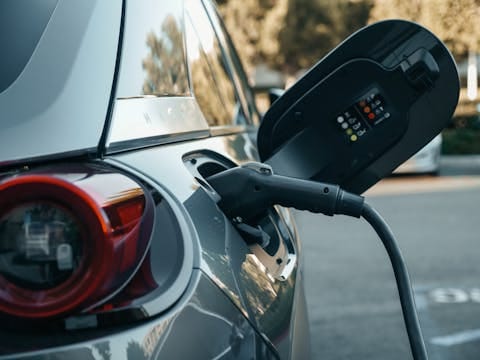 â
â
It can be challenging to choose between a hybrid and an electric vehicle (EV). Both options reduce your gas costs and are better for the environment than traditional gas-powered cars. Struggling to choose between the two? Well, your driving habits and needs can help you weigh both equally. We've put together this guide to help you figure out which option best fits your lifestyle and deserves a spot on your driveway.
Understanding the Core Differences: Hybrids vs. EVs
Hybrid vehicles are the perfect blend of electric motors and gas engines. Perfect for those drivers who may want a greener footprint without sacrificing gas power. How do they work? Many have regenerative braking systems. This means they recover some of the energy lost during braking, directing it to the battery or electric motor.
Standard hybrids can travel about a mile on electricity alone before switching between power sources. Plug-in hybrids offer around 20 to 70 miles of electric-only driving. This setup enables gas-free daily commutes while providing backup power for longer trips.
EVs run entirely on batteries, typically going 300 to 400 miles before they need to be charged. The 2025 Chevrolet Blazer EV offers 334 miles of estimated range, while the more compact Chevrolet Equinox provides 319 miles. Chevrolet's only electric truck, the Silverado EV, can reach an impressive 460 miles.
Comparing the Pros and Cons of Hybrid Vehicles
Hybrid cars consume less fuel by utilizing their electric motors at lower speeds, which helps to reduce gas bills for North Texas drivers. These vehicles put out fewer carbon emissions, contributing to better air quality in the Dallas-Plano area. They're also much quieter than traditional cars due to the electric motor. Because of their gas-powered engine, it also helps eliminate the range anxiety experienced by many EV owners.
In terms of upkeep, hybrids put less strain on their engines due to electric assistance, meaning fewer visits to the mechanic. There's no need to search for charging spots either — you can simply fuel up at any gas station when traveling beyond the DFW area. Price-wise, hybrids are often cheaper than comparable EVs.
However, hybrids usually cost more to buy than similar conventional cars and contain more complex systems involving both engine and electric components. Their electric-only range is limited, and they're not as environmentally friendly as full EVs. Battery replacements can cost over $2,000, although warranties usually cover them for 10 years. Additionally, hybrids still burn gasoline and create emissions, and the extraction of metals, such as lithium and cobalt, for their batteries can have significant environmental impacts.
Comparing the Pros and Cons of EVs
EVs are much more efficient than gas vehicles. Gas engines waste energy as heat, managing just 17% to 21% efficiency, while EVs convert 59% to 62% of battery power into movement. EVs can travel about 43 miles per dollar of electricity versus 10 miles per dollar for gas at $2.50 per gallon.
EVs don't require oil changes due to having fewer moving parts, and their brakes last longer, thanks to regenerative braking technology, which reduces pad wear. Other benefits include instant torque, quiet operation, and possible high-occupancy vehicle (or HOV) lane access. EVs also deliver immediate acceleration with no delay. The 2025 Blazer EV, for example, can go from 0 to 60 mph in about 6 seconds. Unlike hybrids, which can occasionally stutter when switching between power sources, EVs consistently deliver smooth performance.
Nevertheless, range limitations exist. Some budget EVs can only reach 60 to 120 miles on a single charge, although Chevrolet's premium models can all go 300 miles or more. Home Level 1 and 2 chargers may take up to 80 hours for a full charge, whereas fast chargers need 30 minutes to reach 80%. Cold weather can also reduce EV performance — an important consideration on North Texas winter days.
Which Is Better for You? Making the Decision
Your driving habits play a role in determining the best choice for you. If you typically stay within the Plano-Dallas area, drive under 200 miles daily, and have a home garage, an EV could be a great fit. In Plano, there are more than 100 public charging stations, including locations at Legacy Town Center, North 40 Parking Lot, CBRE Parking Garages, and Kroger Store 598. These stations support various networks, such as Blink, Tesla, ChargePoint, and SemaConnect. However, if you frequently make longer trips to Austin or Houston, a hybrid may work better for you.
Find Your Perfect Vehicle at Huffines Chevrolet Plano
Whether to choose a hybrid or an electric car depends on your daily driving needs and priorities. Whether you want the greenest option, the lowest operating costs, or prefer not to change how you refuel, there's a vehicle that's sure to match your North Texas lifestyle.
Ready to experience these technologies firsthand? Contact us at Huffines Chevrolet Plano and browse our hybrid and electric inventory. Our team understands what Plano drivers need, whether that's a fuel-efficient hybrid for those San Antonio weekend trips or an EV for your Legacy Business Park commute.
Image by Kindel Media is licensed with Pexels License